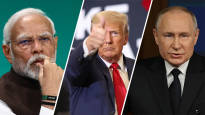United States, India, Britain, EU, Taiwan, Moldova – 2024 is a historic election year. The turbulent situation in world politics makes the election year particularly significant.
2024 will be the election year of all time. Elections will be held in 40 countries with a total of 3.2 billion people, news agency Bloomberg reports. Countries holding elections make up 42 percent of the entire world’s gross domestic product.
The election year 2024 is also significant because of the turbulent situation in world politics. In addition to the great powers, elections are held in, for example, Taiwan and Moldova, which, despite their small size, are significant on the stage of world politics.
Not all elections held next year will be free. For example, the presidential elections in Russia and Venezuela are held under tight control of the security apparatus.
We listed the highlights of the historic election year.
United States: The second coming of Trump?
The US presidential election will be held on November 5. The importance of the election is hard to exaggerate: the world’s richest country forms the backbone of the military alliance NATO and influences trade and military power everywhere.
However, there may be changes to NATO cooperation or support for Ukraine, for example, if the Republicans’ most likely presidential candidate Donald Trump defeat the most likely Democratic candidate, President Joe Biden.
In his previous election term, Trump took the United States in a more isolated and protectionist direction, for example by threatening trade wars and withdrawing from the Paris climate agreement. The sitting President Biden committed to making an impact on the world stage, for example by supporting Ukraine and promoting the NATO membership of Finland and Sweden.
If Trump is re-elected, the role of the United States in world politics may change again for years.
Asia: India and Taiwan at the crossroads
In India, the world’s most populous democracy, representatives of the Lok Sabha, the lower house of the parliament, are elected in elections held between April and May.
The main competitors are the current prime minister Narendra Modi’s the governing coalition, the right-wing National Democratic Alliance, and the coalition of opposition parties, the left-wing Indian National Developmental Inclusive Alliance (INDIA). The INDIA coalition is led by the Congress party Mallikarjun Khargen.
Under the rule of Modi’s BJP party, India has taken a more nationalist tone than before. Modi emphasizes the position of Hindus in a country of numerous different ethnic groups. Modi’s tighter grip has also been noticed abroad: in recent months, India had to respond to accusations from the United States and Canada about India’s links to the assassination projects of Sikh separatists in North America. Recently, the Modi administration was accused of spying on journalists with a hacking program.
The INDIA coalition offers the protection of the constitution, social justice and equality of different population groups as an alternative.
Growing economic power India is in an important gap between “East and West”: it wants to maintain its relations with both the United States and Russia.
People are also heading to the polling booths on a massive scale in Indonesia with a population of 279 million, Bangladesh with a population of 170 million and Pakistan with a population of 241 million.
The small island nation of Taiwan will vote in presidential elections at the beginning of the year. The election is defined by the country’s relationship with China, which sees the island as part of itself. Opposite are the leader of the polls of the DPP party, which has a suspicious attitude towards China William Lai and the Kuomintang, which has a more favorable attitude towards China Hou Yu-ih.
Europe: Will the far right rise in the parliamentary elections?
There are plenty of election tensions in Europe as well. The first post-Brexit EU parliamentary elections will be held on June 9.
The far right has been on the rise across the Union. This could have significant implications for the distribution of seats in the Brussels Parliament.
In the past, the center-right EPP group has run Brussels in cooperation with the social democratic S&D.
Now the EPP can get a new support from the ECR, which gathers Eurosceptic parties.
EU member states also elect their own decision-makers. In January-February, Finland will decide on a new, first NATO-era president. In the Nordic countries, Iceland will also hold presidential elections in June.
In the heart of the EU, a new government is being elected in Belgium, as well as in Austria. Early parliamentary elections are likely to be held in Romania next year.
A conservative prime minister in Britain, which went its own way due to Brexit Rishi Sunak has said that he will hold early elections either in the spring or in the fall. The Conservatives’ 13-year reign, colored by internal power struggles, could end if Labour’s Keir Starmer make the British believe in the Labor Party’s vision of the country’s course.
Moldova, suffering from Russian influence attempts, will vote for a new president during the spring. Current president, pro-Western Maia Sandu is applying for an extension. A pro-Russian person has signed up as a racing partner Renato Usatii. The Kremlin is following the election campaign in Moldova with a close eye.
EU member candidate Georgia should also be prepared for attempts to influence Russia in the parliamentary elections in October.
Russia: Putin’s performance
Next year’s perhaps most predictable presidential election will be held in March in Russia. President Vladimir Putin is applying for an extension, and most likely will get it too.
Although the Kremlin would take care of a positive election result for Putin, there are open questions related to Putin’s campaigning and the public debate sparked by the elections. Will the Kremlin’s surveillance machinery succeed in silencing all the rumblings of sanctions, brain drain and war losses?
